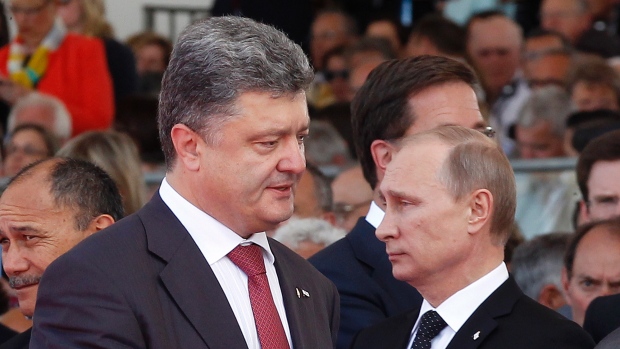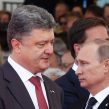
Could Normandy Help Ukraine Contain Russia?
Publication: Eurasia Daily Monitor Volume: 11 Issue: 103
By:

Russian President Vladimir Putin had more meetings than could have been expected with his European peers and even with US President Barack Obama during the ceremonies in Normandy last Friday (June 6), which marked the 70th anniversary of the Allied D-Day invasion. This exemption to the policy of isolating Russia, which Obama had declared successful only a week prior, was granted not only due to the special occasion but also on the condition that Moscow refrained from inciting further unrest in eastern Ukraine. One key demand from the G7 summit that had taken place in Brussels last Thursday (instead of the G8 summit in Sochi that would have included Russia) was for all international actors to recognize the legitimacy of the Ukrainian government (Nezavisimaya Gazeta, June 6). Putin obliged by meeting newly-elected President Petro Poroshenko under the watchful eye of German Chancellor Angela Merkel and uttering some political words about the need to stop violent clashes (Kommersant, June 7).
This handshake was a major success for Poroshenko, who used his inauguration ceremony on Saturday to declare that political power in Ukraine would be de-centralized and local authorities would be empowered according to a new constitution, but that Ukraine would remain a unitary state (https://www.gazeta.ru/politics/2014/06/06_a_6062509.shtml). This firm rejection of Russian demands for Ukraine’s federalization and the new president’s pledge to restore territorial integrity are certain to increase the desperation of Moscow-backed separatists engaged in heavy fighting against government troops around Slovyansk (Moskovsky Komsomolets, June 7). This small town has become the epicenter of the civil war waged increasingly by Russian “volunteers” of different persuasions, who continue pouring in across the border, which the Ukrainian forces cannot control and the Russian authorities deliberately keep open (Vedomosti, June 6). The war has gained much force, and Poroshenko as the commander-in-chief has to gather every military instrument available (including the trickle of US aid) in order to defeat the warlords without alienating the population, because his next step has to be staging legitimate and representative parliamentary elections.
This mission may be accomplishable only if Russia proceeds from its low-profile manipulation of the localized hostilities to real non-interference; but that would signify a complete reversal of the Kremlin’s policy of protecting Russian-speaking “compatriots” abroad and an admission that the Ukrainian revolution has triumphed (https://slon.ru/world/pochemu_putin_sdast_donbass-1103680.xhtml). The former is unacceptable to Russia’s domestic “patriots” who have been riled up by the hysterical state propaganda. Putin’s diplomatic maneuvering in Normandy, for that matter, is hardly going to inspire public support due to the public’s negative attitudes toward the United States and the European Union, which have reached an all-time high (https://www.levada.ru/05-06-2014/otnoshenie-rossiyan-k-drugim-stranam). The latter is personally infuriating for Putin, who has placed the resolute struggle against “color revolutions” at the center of Russian military doctrine and foreign strategy, including in the newly strengthened alliance with China (https://newsru.com/russia/06jun2014/patrushev.html). Playing with the rebellion without committing to its victory might appear to the Kremlin to be a better option, but this game is too transparent and Putin has been warned by Merkel about possible new sanctions (https://www.gazeta.ru/politics/2014/06/05_a_6059837.shtml).
The sanctions already at work mostly target individuals, and they do not even cover the Mistral-class amphibious assault ships being constructed in France for Russia, which are supposed to make a major incentive for Putin to behave (https://ria.ru/defense_safety/20140604/1010728497.html). Despite talks about possible further contracts, investors are wary of high-risk premiums and of Russia’s reputational damage, since the global public attitude toward the country has become strongly negative (https://newsru.com/world/04jun2014/bbc.html). The combination of high inflation and negative growth requires a strong economic policy to regain dynamism, but presently Ukraine is far more likely to launch painful reforms in order to pull back from the brink of state failure than Russia, where political will is focused on geopolitical ambitions. Putin pins his expectations on mega-projects like the natural gas pipeline to China, but their costs rise beyond any reasonable measure. For example, the newly-designed bridge to the Crimean peninsula across the Kerch Strait has a price tag of $10 billion (RBC Daily, Nezavisimaya Gazeta, June 6). Riding the “patriotic” wave makes it possible for the Kremlin to remain in denial about the detrimental impact of state control over the economy, but in the course of back-pedaling to calmer waters, the inadequacy of economic decision making is inevitably revealed.
Putin likely understands that the diplomatic dance in Normandy cannot help him to resolve Russia’s problems of falling revenues and rising expenditures—at best it can only ease him down the slippery slope of economic dislocation. The Russian president probably also has few illusions regarding the usefulness of the new energy contracts with China, and not only because his Beijing counterparts firmly put their economic interests first but also because Chinese business remains impregnable to Russian corruption, while producing plenty of its own. The European market, on the contrary, has for years been the main destination for Russian corruption, so Putin is now trying to use the convenient conduits, such as Cyprus or Austria, to influence the opinions in the key financial centers of London and Frankfurt. One particular case involves the South Stream gas pipeline, which is designed to cross the Black Sea well clear of Crimean shores; the European Commission seeks to put this controversial project on hold, but Austria, Bulgaria, Hungary and Serbia are eager to proceed with their special deals with Gazprom (https://slon.ru/world/kak_es_svergaet_pravitelstvo_bolgarii_chtoby_ostanovit_yuzhnyy_potok-1109648.xhtml).
Ukraine has only a small opportunity to escape from economic implosion and state failure, but even this slim chance constitutes a major threat to Putin’s Russia. If reforms and reconciliation put Ukraine on the track of building a democratic and European state identity, Putin’s corrupt authoritarian petro-state project would be compromised and defeated. Moscow, therefore, will make sure that every step Kyiv makes along this track is punished by economic sanctions and military threats. Strained dinners and reluctant handshakes offered in Normandy cannot dissuade Putin from delivering this punishment, but Euro-Atlantic unity, on which Obama is working hard, can deter the Kremlin from experimenting with proxy war. The annexation of Crimea eliminates the West’s political options regarding creating incentives for Russia to cooperate on rehabilitating Ukraine. Consequently, the need is greater for building credible instruments of containing the inherent aggressiveness of an arrogant and desperate regime.




